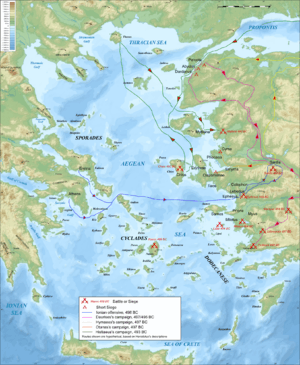499 BC
Year 499 BC was a year of the pre-Julian Roman calendar. In the Roman Empire it was known as the Year of the Consulship of Aebutius and Cicurinus (or, less frequently, year 255 Ab urbe condita). The denomination 499 BC for this year has been used since the early medieval period, when the Anno Domini calendar era became the prevalent method in Europe for naming years.
| Millennium: | 1st millennium BC |
|---|---|
| Centuries: | |
| Decades: | |
| Years: |
| 499 BC by topic |
| Politics |
|---|
| Categories |
| Gregorian calendar | 499 BC CDXCVIII BC |
| Ab urbe condita | 255 |
| Ancient Egypt era | XXVII dynasty, 27 |
| - Pharaoh | Darius I of Persia, 23 |
| Ancient Greek era | 70th Olympiad, year 2 |
| Assyrian calendar | 4252 |
| Balinese saka calendar | N/A |
| Bengali calendar | −1091 |
| Berber calendar | 452 |
| Buddhist calendar | 46 |
| Burmese calendar | −1136 |
| Byzantine calendar | 5010–5011 |
| Chinese calendar | 辛丑年 (Metal Ox) 2198 or 2138 — to — 壬寅年 (Water Tiger) 2199 or 2139 |
| Coptic calendar | −782 – −781 |
| Discordian calendar | 668 |
| Ethiopian calendar | −506 – −505 |
| Hebrew calendar | 3262–3263 |
| Hindu calendars | |
| - Vikram Samvat | −442 – −441 |
| - Shaka Samvat | N/A |
| - Kali Yuga | 2602–2603 |
| Holocene calendar | 9502 |
| Iranian calendar | 1120 BP – 1119 BP |
| Islamic calendar | 1154 BH – 1153 BH |
| Javanese calendar | N/A |
| Julian calendar | N/A |
| Korean calendar | 1835 |
| Minguo calendar | 2410 before ROC 民前2410年 |
| Nanakshahi calendar | −1966 |
| Thai solar calendar | 44–45 |
| Tibetan calendar | 阴金牛年 (female Iron-Ox) −372 or −753 or −1525 — to — 阳水虎年 (male Water-Tiger) −371 or −752 or −1524 |

Main events of the Ionian Revolt
Events
By place
Greece
- After a failed attack on the rebellious island of Naxos in 501 BC (on behalf of the Persians), Aristagoras, to save himself from the wrath of Persia, plans a revolt with the Milesians and the other Ionians. With the encouragement of Histiaeus (his father-in-law and former tyrant of Miletus), Aristagoras, governor of Miletus, induces the Ionian cities of Asia Minor to revolt against Persia, thus instigating the Ionian Revolt and beginning the Greco-Persian Wars between Greece and Persia. The pro-Persian tyrant of Mytilene is stoned to death.
- Miltiades the Younger, the ruler of the Thracian Chersonese, which has been under Persian suzerainty since approximately 514 BC, joins the Ionian revolt. He seizes the islands of Lemnos and Imbros from the Persians.
- Aristagoras seeks help with the revolt against the Persians from Cleomenes I, king of Sparta, but the Spartans are unwilling to respond.
Births
Deaths
References
This article is issued from Wikipedia. The text is licensed under Creative Commons - Attribution - Sharealike. Additional terms may apply for the media files.